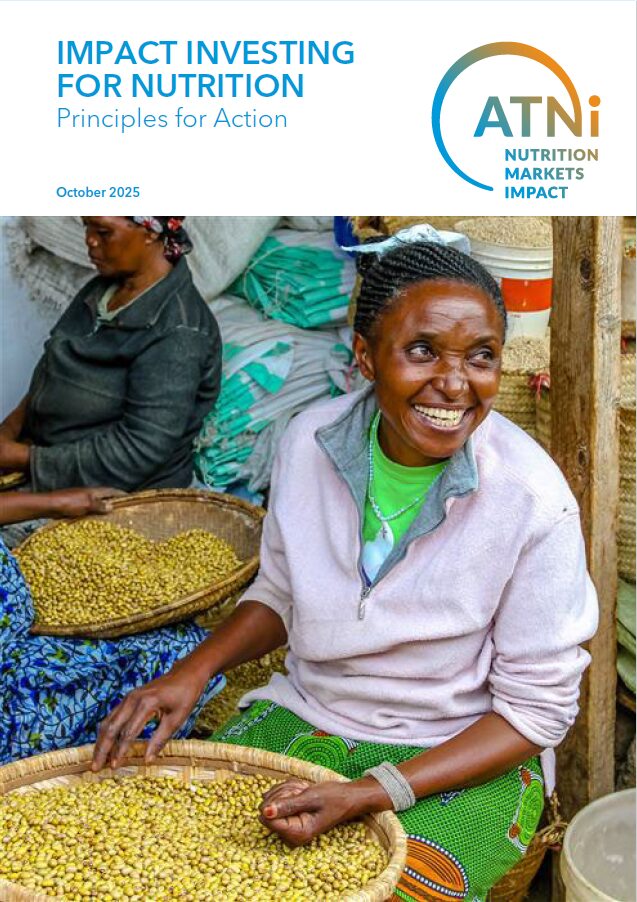
Impact Investing for Nutrition (II4N)
Prioritizing nutrition as an impact investing theme to increase the availability and affordability of healthy, safe and nutritious food.
Impact investing is a practice that combines financial returns with positive social and environmental outcomes, has gained traction in emerging markets in recent years. Agri-food small, and medium-sized enterprises (SMEs) are estimated to grow and process more than half of the food consumed worldwide. They have the potential to drive positive change and transform current food systems.
Why impact investing for nutrition?
Finance can be used to drive better inputs, production, aggregation, trading, processing, and marketing of healthier foods in low- and middle-income countries (LMIC). Many of the local enterprises delivering foods with potential to affect nutrition outcomes in low-income households operate in difficult markets with weak financial systems, poor infrastructure, and low consumer education. (cont…)
These enterprises often face tensions between driving their financial profitability and envisaged impact as they scale. Most of these companies need a combination of working capital financing and a longer-term investment in productive assets (such as equipment for processing or fortifying foods) to increase production and improve efficiency.
To help enable more nutritious food supplies by agri-food SMEs, the overarching goal of this project is to unlock impact investments for SMEs so they can produce healthier foods and help improve nutrition in Sub-Saharan Africa. The project aims to unlock a supply of relevant financing which will in turn stimulate the production of more affordable, safe, and nutritious foods, making them accessible to at-risk populations by encouraging greater impact investments in nutrition.
Read more about how innovative finance can drive better nutrition outcomes in Africa here.
Foundations of II4N
In 2023, ATNi (Access to Nutrition initiative) screened 120 impact funds, 31 of which are active in Tanzania, 36 actives in Uganda, and 22 which had no country or region specified in the African continent.
In addition, over the reporting period, ATNi served as an advisor to the Transformational Investing in Food Systems (TIFS) project which screened 23 impact funds investing in the agri-food sector.
Looking at the impact funds screened, health and nutrition emerged as the main gap among the impact themes. While further research is needed, underinvestment in health appears to be linked to at least three overarching issues:
- The externalities of malnutrition are still not properly costed;
- Nutrition metrics are not fully developed for impact investing and those that do exist are not harmonised nor specific to emerging markets; and
- Knowledge and awareness of nutrition and its importance is systematically lacking by investors and SMEs.
- The investment theses for agriculture and food rarely look at nutrition.
On 7 December 2023, ATNi hosted a multi-stakeholder hybrid event focused on ‘Allocating Impact Investment for Nutrition in Emerging Markets’ convened in partnership with iGravity. During the event ATNi brought together diverse voices from stakeholders with expertise on the topic such as donors/ funders, impact investors, Agri-SMEs, NGOs, health professionals and more.
Project Overview
Building the business case for nutrition-sensitive investing in Sub-Saharan Africa.
Research Objectives
- To increase the availability of finance for nutrition-sensitive SMEs (by building the business case and metrics for nutrition).
- To encourage SMEs to adopt more nutrition-sensitive practices (by adoption of an SME tool or other nutrition-related tools).
Methodology
To address these key problems, there are three interconnected components that build the business case:
- Nutrition-sensitive investing approach
- Development of Nutrition Impact Investing Principles
- Provision of technical support to SMEs
Nutrition-sensitive investing approach
ATNi, in partnership with iGravity, are working to embed nutrition sensitive outcomes within an Impact-Linked Finance Fund (ILFF) to improve nutrition outcomes in Sub-Saharan Africa. The ILFF provides finance to high-impact enterprises and directly rewards these for positive outcomes generated through their activities. Ultimately, it should attract more funding for impact investors focused on nutrition outcomes.
Nutrition Impact Investing Principles (NIIP)
The NIIP represent a transformative, community-oriented approach to scaling nutrition-sensitive impact investments. They are rooted in extensive research and a thorough review of six key frameworks already shaping the field. The first version was published in December 2024, with the latest version updated in October 2025.
Principles for Action:
- Enhance Nutritional Impact of Foods
- Improve the Supply of Nutritious Foods
- Ensure Equitable Access to Nutritious Foods
- Promote Consumer Awareness of Nutrition
- Enhance Nutritional Quality
By synthesizing the emerging good practices and addressing existing gaps in impact investing for nutrition, the NIIP offers a roadmap for the finance community seeking to provide impact investments for businesses so they can produce, market, and distribute healthier, more accessible, and affordable foods. These Principles aim to catalyse collaborative action across sectors, fostering innovation and driving measurable progress in improving global nutrition outcomes while contributing to sustainable development.

Nutrition Finance Business Monitoring
In the final phase of this project, after a consensus has been achieved on the NIIP and reporting metrics, ATNi will launch the Nutrition Finance Business Monitoring tool, which will help to create an investment pipeline.
Unlocking Impact Finance for Nutrition

On 5 December 2024, ATNi and its partners, iGravity and Transformational Investing in Food Systems, convened in Nairobi, Kenya for the ‘Impact Finance for Nutrition‘ roundtable event and panel discussion.
Over 130 participants attended in person and online, including donors, development finance institutions, agri-food businesses, agri-food funds and technical support providers from sub-Saharan Africa to shape the impact investing sector for better nutrition outcomes.
Over the course of the event, panelists and speakers including Marina Plyta, Greg S Garrett, Luiana Temba, Salome Akite, Fabio Rappenecker, Khadija Mohamed-Churchill, Mary Cherop, and Leah Richardson addressed the challenges, current landscape, and opportunities for nutrition investing, gave examples of ESG nutrition-metrics for investing, and explored investments to improve food security and child food poverty.
This event offered an opportunity to review a draft of the Nutrition Impact Investing Principles and discuss how it can support nutrition-sensitive investments at scale in LMICs.

The timeline for this project is projected for 2024 – 2025.
For more information linked to the project, please reach out to:
Hammed Jimoh – Partnerships Manager
hammed.jimoh@atni.org

